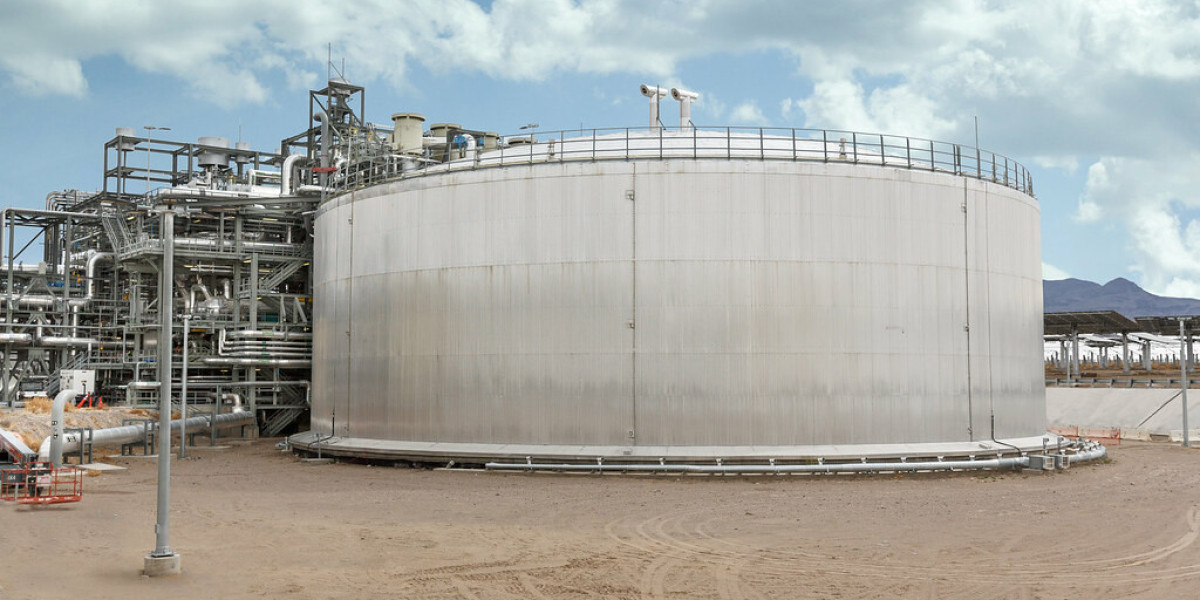Thermal energy storage (TES) has become an essential component in the transition towards sustainable energy systems, especially in India, where the demand for clean energy solutions is rising rapidly. The India thermal energy storage market has gained significant attention due to its potential to store excess thermal energy for later use, helping to bridge the gap between energy production and consumption. As renewable energy sources like solar and wind gain traction, the need for efficient energy storage technologies, including thermal energy storage, is more pressing than ever. This article delves into the current state, trends, challenges, and future outlook of the thermal energy storage market in India.
Overview of Thermal Energy Storage Technology
Thermal energy storage refers to the process of storing thermal energy for later use. Unlike traditional methods of energy storage such as batteries, TES systems capture heat or cold and store it for use at a later time. These systems are divided into two primary categories: sensible heat storage and latent heat storage. Sensible heat storage involves storing heat in materials like water, rocks, or molten salts, which change temperature when energy is added or removed. Latent heat storage, on the other hand, stores heat in the phase change of materials (such as ice or paraffin wax) that change from solid to liquid or vice versa.
In India, the focus has predominantly been on sensible heat storage systems, particularly those utilizing molten salt due to its high heat capacity and ability to operate at elevated temperatures. Latent heat storage technologies, although promising, are still in early stages of development in the country.
Key Applications of Thermal Energy Storage in India
Thermal energy storage plays a crucial role in several key applications, particularly in energy production, storage, and industrial processes. Some of the primary applications include:
1. Concentrated Solar Power (CSP)
Thermal energy storage is extensively used in concentrated solar power plants to store heat for electricity generation. In India, where solar power is abundant but intermittent, CSP plants equipped with thermal storage systems enable the generation of electricity even during non-sunny hours, ensuring grid stability and reliability.
2. Industrial Heat Management
Industries that require high amounts of heat, such as cement production, steel manufacturing, and chemical processing, can significantly benefit from thermal energy storage systems. By capturing and storing excess heat, industries can reduce their dependency on conventional energy sources and improve overall energy efficiency.
3. District Heating and Cooling
Thermal storage is also employed in district heating and cooling systems to provide centralized heating or cooling to residential, commercial, and industrial buildings. By storing heat or cold during periods of low demand, these systems can release it during peak demand times, improving the efficiency and reducing the overall cost.
Drivers of India Thermal Energy Storage Market Growth
The India thermal energy storage market is experiencing substantial growth due to several key factors that are driving demand and innovation in this sector.
1. Growing Renewable Energy Capacity
India has made impressive strides in expanding its renewable energy capacity, particularly in solar and wind power. However, these energy sources are intermittent, and thermal energy storage can provide a solution to store excess energy during periods of high production for later use. As India continues to ramp up its renewable energy efforts, thermal storage systems will play a critical role in ensuring grid stability and reliability.
2. Government Policies and Support
The Indian government has introduced several initiatives to promote renewable energy and energy storage technologies. Schemes like the National Solar Mission, Make in India, and specific incentives for energy storage are contributing to the growth of the thermal energy storage market. Additionally, regulatory frameworks are being developed to integrate TES technologies into the energy grid.
3. Industrial Energy Efficiency Initiatives
With India focusing on improving energy efficiency across industries, the use of thermal energy storage systems in industrial applications is growing. These systems help industries reduce energy consumption, lower costs, and enhance production efficiency, making them an attractive option for large-scale manufacturing plants.
Challenges Faced by the India Thermal Energy Storage Market
Despite the growth potential, the India thermal energy storage market faces several challenges that could impede its widespread adoption.
1. High Initial Investment
The installation of thermal energy storage systems, especially large-scale ones, requires significant capital investment. While the long-term operational savings are considerable, the initial cost can be a barrier for many companies, particularly small and medium-sized enterprises. Financial incentives and subsidies from the government could help alleviate this challenge.
2. Limited Awareness and Expertise
There is a lack of awareness and technical expertise regarding thermal energy storage technologies among stakeholders, particularly in rural and remote regions. Educational campaigns, workshops, and training programs are essential to raise awareness and build a skilled workforce to implement and maintain these systems.
3. Technological Limitations
Though TES technology has advanced in recent years, there are still challenges related to efficiency, storage capacity, and operational lifespan. More research and development are needed to improve the performance and affordability of thermal storage systems. Materials with higher energy densities and improved heat retention properties are areas of active research.
Future Outlook of India Thermal Energy Storage Market
The future of the India thermal energy storage market looks promising, with several trends expected to shape its development over the next decade.
1. Integration with Smart Grids
As India works towards building a more resilient and smart power grid, integrating thermal energy storage with smart grid systems will become increasingly important. Smart grids equipped with thermal storage capabilities can efficiently balance energy loads, store excess power during off-peak hours, and release it when demand spikes.
2. Technological Advancements
Ongoing advancements in materials science and heat storage technologies will likely lead to more efficient, cost-effective, and scalable thermal storage solutions. Innovations in phase change materials (PCMs), high-temperature molten salts, and thermochemical storage systems are expected to enhance the performance of TES systems.
3. Private Sector Investments
With the rising demand for energy storage solutions, private companies are likely to invest heavily in thermal energy storage technologies. Collaborations between government bodies, research institutions, and private enterprises could further accelerate the development and deployment of TES systems in India.
4. Hybrid Storage Solutions
Hybrid energy storage systems that combine thermal storage with other forms of energy storage (such as batteries or pumped hydro storage) may become increasingly common in India. These systems offer greater flexibility and scalability, helping to meet the varying demands of industrial, commercial, and residential sectors.
Conclusion
The India thermal energy storage market is poised for significant growth as the country continues to prioritize clean energy and energy efficiency. Thermal energy storage technologies offer a viable solution to the intermittent nature of renewable energy and the growing demand for industrial heat management. While challenges such as high initial costs, technological limitations, and limited awareness remain, the future looks bright for the market with continued government support, technological innovations, and increasing private sector investments. As India transitions to a greener energy future, thermal energy storage will play a pivotal role in ensuring energy reliability, sustainability, and affordability.
More Trending Reports
renewable energy transition market Share








